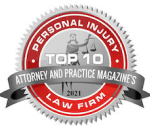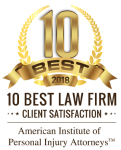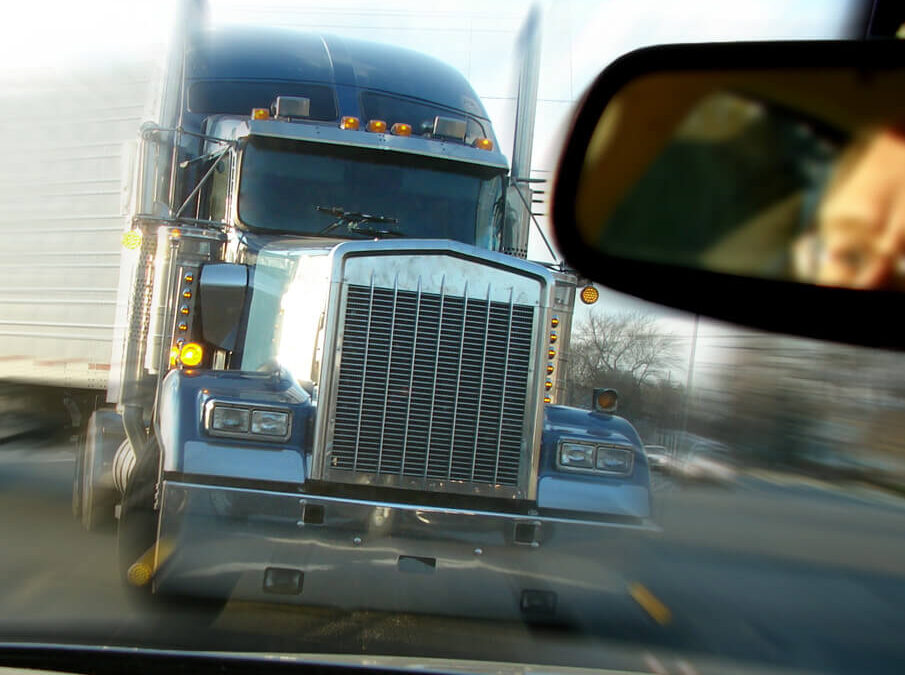Your two main priorities after being involved in a truck crash in The Constitution State is to seek emergency medical attention and get police assistance by calling 911.
Whether you were the driver, a passenger, or a pedestrian involved in the accident, it’s also important to know your legal rights and take the necessary steps to protect yourself. This includes documenting the accident and considering legal action.
In this guide, we’ll take a closer look at some of the key things you should do after a truck accident in CT.
5 Essential steps to take after a truck collision
Assuming that you are not seriously injured, here are a few essential steps to take after a truck collision in CT.
1. Immediate action: Check for safety and contact the police
After ensuring you’re in a safe position, your immediate action should prioritize safety and legal responsibilities. Turn off your vehicle’s engine, turn on your hazard lights and check on the well-being of everyone involved in the accident. If anyone is hurt, it’s imperative to seek medical attention immediately. Remember, some injuries might not be visible or immediately apparent.
Next, you’d want to contact the police to report the accident, regardless of how minor it may seem. This ensures that there’ll be an official police accident report of the accident and helps with insurance claims and legal proceedings if necessary. Always ensure to provide the cause of the accident clearly to the authorities.
Plus, the police can also help secure the scene, guide traffic away from the accident site, and provide necessary emergency assistance if required.
2. Gather evidence from the accident scene
Once you’ve ensured everyone’s safety and contacted the police, the next vital step is to document the accident scene meticulously.
Use your smartphone or any available camera to take pictures and videos from various angles, capturing the:
- Positions of all vehicles involved
- Extent of damage to each vehicle
- Visible injuries
- Road conditions
If your vehicle is equipped with a dashboard camera, be sure to save the footage as well.
In addition, you’ll need to exchange information with the truck driver, witnesses, and anyone else involved in the crash. Gather contact information such as:
- Names
- Contact details
- Insurance information
- Truck driver’s employer information and the vehicle license plate number
While doing this, be careful not to discuss fault or specifics about how the accident occurred. Conversations about the accident’s cause should be left for later discussions with your insurance provider and legal counsel, as premature or unfounded admissions of fault can complicate legal and insurance processes.
3. Get proper medical attention
Seeking prompt medical assistance is crucial, even if you do not observe any injuries. In the immediate aftermath of an accident, adrenaline and shock can mask pain and injuries. This natural response might lead you to believe that you are uninjured, or tempt you to dismiss minor discomforts. It’s important to get checked, even if you feel fine initially.
Some injuries, particularly those like internal bleeding, concussions, or whiplash, may not present symptoms immediately. These conditions can have serious, long-term implications if not diagnosed and treated promptly.
Ensure that you see a healthcare professional as soon as possible after the accident to rule out hidden injuries. Your health should always be your top priority, and having a medical record on file will also be important for insurance claims and any potential legal actions.
4. Legal and insurance communication
Carefully managing communications with legal and insurance entities is one of the trickiest things to do after a crash.
First and foremost, avoid admitting fault, signing any documents or accepting any offers from insurers before consulting with an experienced truck accident lawyer. This advice stands even if the offer seems fair at first glance. An initial offer from the insurance company may lowball you, not taking into account the long-term impact of the accident, including ongoing medical treatment, rehabilitation costs, and loss of income.
Even so, be sure to notify your insurance company about the accident promptly, as this is likely a requirement of your policy. However, when providing details about the accident, be cautious.
Insurance companies have extensive experience in reducing payouts and may use your statements against you to minimize the compensation you receive.
An experienced Hartford truck accident lawyer can communicate on your behalf, ensuring that your narrative is accurately and effectively presented, thereby avoiding common pitfalls that could jeopardize your claim.
5. Consult with a personal injury lawyer
Consulting with an experienced truck accident attorney is a pivotal step towards safeguarding your rights and ensuring fair compensation. The aftermath of a truck collision involves navigating a complex maze of legal and insurance claims processes, often entangled with intricate regulations specific to commercial trucking.
An adept lawyer will not only guide you through these complexities but will also represent your best interests in negotiations with insurance companies and in court, if necessary. Their expertise becomes particularly invaluable when it comes to identifying liable parties—be it the truck driver, their employer, or the vehicle manufacturer—and holding them accountable.
Do not wait to take action. Contact us today at (860) 231-9535 to schedule a free consultation with a seasoned lawyer who specializes in truck accidents.

Further essential guidance
In addition to the above steps, there are a few other essential pieces of guidance to keep in mind.
Rights and responsibilities
Among the most fundamental rights you hold is the right to decline immediate settlement offers.
Insurance adjusters are adept at convincing victims to accept less than they are entitled to, especially when victims are not fully aware of their rights or the extent of their injuries and related costs. Always remember, you have the right to review any settlement offer with a legal professional before making a decision. This not only ensures that your rights are protected but also maximizes your compensation.
While it’s your responsibility to cooperate and provide accurate information during the claims process, it’s also crucial to be cautious about what you say. Avoid discussing details of the accident or your injuries with anyone other than your lawyer.
Long-term considerations
Assessing and addressing potential long-term health issues or disabilities is paramount. Often, the true extent of injuries does not fully manifest until well after the accident. Conditions such as chronic pain, mobility issues, or cognitive impairments may develop, significantly impacting your quality of life and ability to work. It’s crucial to consider these potential long-term effects when pursuing compensation.
Failure to account for future medical expenses, rehabilitation costs, and potential loss of income could result in a settlement that falls short of your needs. Consulting with medical professionals who specialize in trauma-related injuries can provide a clearer picture of what your recovery process might entail.
This information, combined with the expertise of your lawyer, ensures that any settlement or judgment considers the full spectrum of your needs, both immediate and long term. Without this foresighted approach, victims might find themselves struggling to cope with unanticipated challenges and expenses, long after the legal and insurance processes have concluded.
Mental Health
The psychological aftermath of a truck accident can be just as debilitating as physical injuries, if not more so.
Victims may experience a range of emotional responses, including shock, anger, confusion, and fear. More severe mental health issues, such as post-traumatic stress disorder (PTSD), anxiety, and depression, can also emerge, significantly affecting your daily life and well-being.
It’s essential to acknowledge these feelings as valid and seek professional support or counseling. Mental health professionals specialize in helping individuals process traumatic events, offering coping strategies to manage stress, anxiety, and other emotional issues. Support groups provide a sense of community and understanding, allowing victims to share their experiences and recovery journeys with others who have faced similar challenges.
Early intervention is key to preventing long-term psychological issues. If you or someone you know is struggling in the aftermath of a truck accident, consider reaching out to a mental health professional or counselor.
Insurance process
The insurance claim process following a truck accident can be markedly more complex than typical car accidents, largely due to the potential involvement of multiple liable parties. Trucking companies, the truck manufacturer, or even the cargo loaders could bear some responsibility for the incident. Each may have separate insurance policies, complicating the claims process further.
When dealing with trucking companies’ insurers, understand that these entities are often prepared to mitigate liability and minimize payouts. They employ skilled adjusters and legal teams specializing in trucking accidents, making it challenging for individuals to negotiate fair compensation on their own.
Additionally, due to the intricate regulations governing the trucking industry, your attorney can leverage specific legal knowledge to strengthen your case. This might include regulations related to truck maintenance, driver rest periods, and cargo loading standards, any of which could be pertinent to your claim.
Preventive Measures
Adopting preventive measures can significantly reduce the risk of future truck accidents for drivers. Here are essential tips for staying safe:
- Stay Visible: Trucks have larger blind spots compared to passenger vehicles. Ensure you’re visible to truck drivers by avoiding these blind spots, often located at the rear, in front of the cab, and along the sides. If you can’t see the truck’s mirrors, the truck driver likely can’t see you.
- Keep a Safe Distance: larger vehicles need a longer stopping distance than cars, especially under heavy loads or adverse weather conditions. Giving them more space enhances your safety and theirs.
- Anticipate Wide Turns: Trucks need extra room to make turns, often veering into adjacent lanes to maneuver corners. Always give trucks ample space to complete their turns and avoid squeezing between a truck and the curb.
- Avoid Abrupt Maneuvers: Signal your intentions well in advance, be it lane changes or turns, to give truck drivers time to react appropriately.
- Stay Patient: Lower speeds on uphill climbs and restrictions in certain lanes can frustrate car drivers. Exercise patience and understanding, and avoid risky maneuvers to pass or cut in front of trucks.
By incorporating these tips into your daily driving practices, you contribute to safer roads for everyone. Remember, sharing the road responsibly and being aware of the challenges truck drivers face can dramatically reduce the likelihood of accidents.
Is Connecticut a no-fault state for truck accidents?
Connecticut is not a no-fault state for vehicle accidents, including truck accidents. This means that, in the event of a truck accident, the state uses a fault-based system (also known as a tort liability system) to determine who is responsible for compensating the victims.
Under this system, the person who caused the accident (or their insurance) is liable for the damages incurred by the victims. This includes medical expenses, property damage, lost wages, and other associated costs.
Victims have the option to file a claim with their own insurance, pursue a claim against the at-fault driver’s insurance, or take legal action to seek compensation. The state of Connecticut allows for comparative fault, meaning that if both parties share some degree of responsibility, the compensation can be adjusted according to each party’s level of fault.
Need expert legal advice in CT?
As you’ve seen, the aftermath of a truck accident can be complex and overwhelming.
Seeking legal advice from a skilled Waterbury truck accident attorney is essential in navigating the various aspects of your case, from dealing with insurance companies to seeking fair compensation for your losses.
Our personal injury lawyers here at Chambers Law Firm have extensive experience in handling truck accident cases and can help guide you through the process.
Get in touch with us today to learn more about how we can assist you in getting the justice and compensation you deserve. We work on a continency-fee basis, so you don’t even have to worry about any upfront cost.

Key takeaways on what to do after a semi truck accident
Remember to prioritize your safety and seek medical attention if needed. Gather as much evidence as possible and avoid making any statements without consulting your lawyer. If you or a loved one has been involved in a truck accident, our team is ready to assist you.
FAQs
How do I know if I need a lawyer after a truck accident?
Can I still receive compensation if I feel fine but later develop injuries?
Should I talk to the truck driver’s insurance company?
What if the truck driver or their company offers me a quick settlement?
How long do I have to file a claim after a truck accident?
What compensation can I expect after a truck accident?
Can I file a claim if I was partially at fault in the truck accident?

